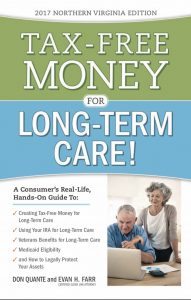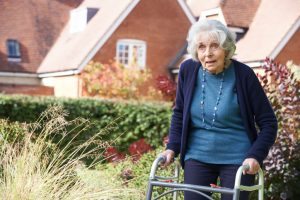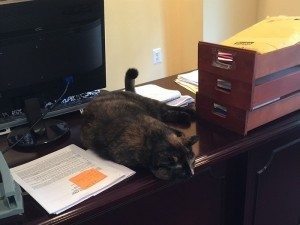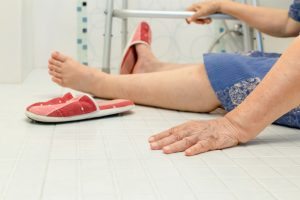When Parting with Your Stuff Becomes Emotional

Q. My husband and I became empty-nesters when our son and daughter moved out and started families of their own. We will be selling our home and moving to a condominium in a senior living community in a couple of months. I admit I’m somewhat of a pack rat, and have a lot of stuff, some of which may have monetary value and some may have just sentimental value. Do you have any downsizing tips for someone like me who is emotionally attached to stuff? We are having trouble determining what to keep, what to get rid of, and what we should save to leave to our children? Do you have any suggestions? Thanks in advance for your help!
A. Through the years, most of us tend to accumulate lots of stuff. We have drawers full of stuff that we have never used (and never will), and boxes of “stuff” we don’t really need but keep “just in case.” Items that we’ve had for years may be difficult to part with due to familiarity and sentimental value, although many of them serve no functional purpose.
Although downsizing can be seen as an opportunity for both renewal and reinvention for some, for others it can be an emotionally laden and even traumatic experience. It may be difficult for some people to get rid of stuff that holds symbolic meaning relative to one’s personal history. This can be an enormously difficult change in life.
It’s not about the objects themselves, but rather the memories connected with them. The best suggestion for managing the emotional stress of downsizing is recognizing what is causing your stress and developing an action plan for handling the downsizing process with minimal added emotional trauma.
Ask yourself these questions:
- Why am I downsizing in the first place? Identify exactly why you are downsizing, and revisit this goal often as you continue through the process. View this process as a positive time when you are creating a new chapter in your life and re-inventing your lifestyle and your surroundings. Remember that the goal of downsizing is to keep items that reflect who you are now, not who you were in the past. By downsizing, you minimize your emotional stress by having fewer responsibilities, a smaller workload, an increased cash flow, and greater flexibility with less to overwhelm.
- Why am I attached to this item? Often items retain their significance because someone special gave them to you or they remind you of a special event in your life. Consider giving these items to others who would appreciate them because of this past significance. But take photos first so you can preserve your memories if you ever want to reminisce.
- What is the worst that will happen if I get rid of this? Are you putting off the decision to downsize because you may need these items some day? Or your kids may need these items? If you have memorabilia from your kids’ lives, set a firm deadline by which the stuff must be picked up. If it isn’t, trash it (but take photos first)! If it’s not worth space in their homes, it’s not worth space in yours.
Include Your Children in Decisions About Family Treasures
Let the children decide what family treasures they want to inherit. For example, one family gave each of their children color-coded sticky dots. They each put colored dots on the things they hoped to inherit. One daughter got the piano, some of her father’s artwork, some of her mother’s crystal, and lots of books. Her sister cherished the lovely china they were never allowed to use when they were little. And the older brother claimed their father’s shop tools. If more than one of them wanted the same item, they dealt with it kindly and with generosity (their parents wouldn’t have allowed any other way).
When it came time for the parents to downsize, they took the artwork, books, and tools they really needed their new apartment. The children were responsible for clearing out remaining items and taking them to their own homes by a certain date. The rest went in an estate sale or to charity.
If You Are Still Having Difficulty. . .
If you can’t decide what to keep and what to get rid of on your own or with the help of your children, you can consider the following:
- Get Independent Minded People to Help: Enlist or hire independent-minded individuals who can help you. Many religious institutions and community organizations, such as Welcome Wagon, can provide helpful resources.
- A Downsizing Get-Together: Spend a memorable evening with close friends reminiscing about various items and books and deciding on where to donate them. A downsizing party can allow for both meaningful emotional expression and celebration of a new stage in life.
- Preserve Pict-Oral Memories of All Sentimental Items Using the Legacy Stories App: If your children choose not to inherit the piano or the artwork or the crystal, try not to take it personally. Instead, use the Legacy Stories App, a service we offer at no cost to all of our clients (past, present, and future), that allows you to create pict-oral memories (narrated photos) by simply snapping a photo with your smartphone, upload it for preservation, and then simply click “record” to share your memories about the photo — what the item is, where it was purchased or how it was received, what were you doing at the time you purchased or received the item, who was with you, what special memories does the item evoke? Then, when your children or grandchildren go to the website and view that photo, they will hear your vocal narration while looking at the photo of your treasured family heirloom. So even if your kids don’t want the item or don’t have room for the item, what a priceless memory you have now created for future generations!
Leaving a Legacy
Want to leave behind something more than your stuff? Ethical Wills are a way to honor the past, remember family and community, understand your own life better, and provide a lasting legacy for your family for generations to come. You can document and share (in writing or via an audio or video recording using the Legacy Stories App) your values, your spiritual beliefs, and your “life’s lessons.”
An Ethical Will may include: cultural and spiritual values; blessings and expressions of pride, love and dreams for children and/or grandchildren; “life-lessons;” requests for forgiveness; the rationale for philanthropic and personal financial decisions; stories about the meaningful personal items that heirs are to receive; and requests for how you would like to be remembered after death.
In connection with creating your Last Will and Testament, Revocable Living Trust, and other Estate Planning documents, we can help you leave your loved ones with your money and assets and something more — a sense of your values. Call us today to set up an appointment for a no-cost consultation:
Fairfax Estate Planning: 703-691-1888
Fredericksburg Estate Planning: 540-479-1435
Rockville Estate Planning: 301-519-8041
DC Estate Planning: 202-587-2797
Critter Corner: What to Bring to A Nursing Home

Dear Commander Bun Bun,
I have been a caregiver for my mother for more than a decade. She is ready to move into a skilled nursing facility. She would like to make her room feel like home, and I’d like to help her do so. Do you know what kinds of personal things can we bring to a nursing home?
Thanks!
Faye Voritt-Thinggs
—
Dear Faye,
Caregivers often help their loved ones sort through their belongings and family heirlooms, to help them decide what to bring to make their nursing home room feel as much like home as possible. Here are some ideas:
- Family pictures are important and can be posted on a bulletin board, stored in a scrapbook or photo album, uploaded to a digital picture frame, or displayed as a collage on the wall. It can be helpful to label each picture with the name of the person and their relationship to your loved one. This enables them to share their pictures without having the pressure of remembering names, faces, and relationships all at once.
- Inexpensive artwork (prints and posters) can help make your mother feel more at home. Numerous vendors sell affordable prints of famous works of art, nature scenes, old movie posters, and much more. The options are endless, though wall space is often limited.
- A music player loaded with your mom’s favorite music can be a very meaningful addition to a loved one’s room. A good pair of headphones may also be a wise investment.
- Other types of treasured items might include favorite snacks or treats, favorite books, or small pieces or items from a personal collection of hers.
Please note that most facilities prohibit breakable items like china and glass, electric blankets, scented plug-ins, any sort of open flame items (such as candles), and, of course, weapons. Be sure to check the rules at her facility for a list of things she can and cannot bring!
Hop your mother’s meaningful items help her feel comfortable in her new room.
Commander Bun Bun
Evan Farr’s New Asset Protection Book Just Released: Buy it TODAY and Get $1,250 in bonuses!

Certified Elder Law Attorney and 3-Time Best-Selling Author Evan Farr’s newest book:
“Protecting Your Assets from Probate and Long-Term Care: Don’t Let the System Bankrupt You and Your Loved Ones” has just been published by Allworth Press.
Mr. Farr’s latest book was just released today on Amazon.com and is already the #1 New Release Book in Elder Law! Buy this new book today, on it’s Official Release Date, and you’ll get $1,250 in special bonuses, detailed below.
•Free copy of Evan Farr’s other recently released book: “Tax Free Money for Long Term Care,” co-authored by Don Quante, and only available through our office (not available on Amazon.com or in stores);

• Free 50-page Special Report: Legal Research Behind the Living Trust Plus™;
• Two $500 Gift Certificates towards legal services from the Farr Law Firm.
This special one-time offer is valid TODAY only. Once purchased, simply email your Amazon.com receipt to renee@farrlawfirm.com. Please allow 1-2 weeks to receive bonuses.
Order TODAY to take advantage of this amazing offer!
—–
Description of “Protecting Your Assets from Probate and Long-Term Care: Don’t Let the System Bankrupt You and Your Loved Ones”
Have you ever considered the advantages of creating a living trust? Avoiding probate through the use of living trusts is a well-known solution, but author Evan H. Farr takes this issue several steps further. In “Protecting Your Assets from Probate and Long-Term Care,” Evan explains the need to consider both probate and the expenses of long-term care when you create a living trust, and he provides tremendous additional information about Medicaid, including numerous Medicaid asset protection strategies that can be used to prevent a family becoming bankrupt when a loved one enters a nursing home.
A revocable living trust, the main tool used for protecting your assets from probate, does not protect assets from the catastrophic expenses of long-term care. A very useful and popular estate planning tool, revocable living trusts are recommended by tens of thousands of attorneys across the United States and are used as the central estate planning document by millions of Americans. However, what most Americans don’t realize is that assets in such trusts are NOT protected from lawsuits or from the limitless expenses associated with nursing homes or long-term care.
In order to help readers protect themselves from both probate and long-term care, Evan Farr delves into the many details you should know when creating a living trust. He also explains his Living Trust Plus™ Asset Protection Trust, which is the only type of self-created asset protection trust that allows you to avoid probate and retain an interest in the trust while also protecting the assets from being counted by state Medicaid agencies. He details the process of avoiding probate and securing assets, including:
• Joint ownership problems
• Special needs planning
• How to pay for the nursing home
• Why Medicaid planning is ethical
• The ten most common Medicaid myths
• Finding the right lawyer
“Protecting Your Assets from Probate and Long-Term Care: Don’t Let the System Bankrupt You and Your Loved Ones” will help to ensure your family does not have to reap the consequences (and expenses) of improperly creating a revocable living trust.
What People Are Saying About It!
“It’s startling how many educated, intelligent Americans still don’t understand that they don’t have to go bankrupt paying for elder care. Protecting Your Assets from Probate and Long-Term Care breaks down complex legal and financial information in plain English. If you own a home or have any assets whatsoever, this book will help you avoid common costly mistakes paying for elder care for yourself or a loved one. It should be required reading for all older adults, their caregivers and any professional advising them.” —Jennifer L. FitzPatrick, MSW, CSP, Author of Cruising Through Caregiving: Reducing The Stress of Caring For Your Loved One and Founder of Jenerations Health Education, Inc
“Evan H. Farr masterfully imparts the secrets of asset protection while helping readers avoid the pitfalls of probate as well as potentially devastating long-term care costs. You get it all! Lessons on planning for: Medicaid, special needs, and elder care compassionately and comprehensively explained.” —Linda Jean Sampson, Esq., Sampson Law Group PLLC
“This book is packed with information that will not only save you money but also save you hours of time trying to understand the system and how it relates to your specific situation.”
—Kate H. Caldwell, gerontologist and elder-care consultant, founder, ElderTree Care Management Services
Why Don’t ALL Nursing Homes Offer This?

Q. My mother has dementia, and things are starting to become too much for me and my father to handle. She used to be so easy going, and now she gets cranky, angry, depressed, and fearful at times. It is so hard to see her like this, and caring for her at home has become challenging.
My dad and I were able to handle the symptoms described for a while now, but there is one thing she does that we can no longer handle, and that’s because we fear for her safety. Despite having the best locks we could find on all the doors, and the big bold signs we put up, mom has wandered out of the house, and has become disoriented. We have been lucky so far. The first time it happened, the delivery person from our favorite restaurant saw her and recognized her, and gave her a ride home. The second time, we got a call from a police officer about it. I can’t sleep at night for fear that she might get out, and something terrible could happen to her, such as getting hit by a car or the nearby VRE train.
Dad and I think it’s time for her to move to a skilled nursing care facility. However, we are still concerned about her wandering. Who’s to say she won’t get disoriented and wander away from the nursing home? When we are looking at nursing homes for my mother, what should we look for to ensure the home is a good fit for someone who wanders? Do you have a list of nursing homes in our area that have technology put in place to prevent dementia patients from wandering? Thanks for your help!
A. Wandering from the home, and in nursing homes, is a major cause of injury for dementia and Alzheimer’s patients. According to a recent study, more than 60% of those with Alzheimer’s or another form of dementia will wander, and if a person is not found within 24 hours, up to half of individuals who wander will suffer serious injury or death.
When a patient completely leaves the facility or home, it is known as elopement. This is the most dangerous kind of wandering. You have reason to be concerned, and need to find a nursing home with proper accommodations to ensure your mother’s safety.
Elopement in Nursing Homes
New dementia or Alzheimer’s patients in nursing homes are particularly prone to wandering, and sometimes elopement if they can find a way out. In many cases, these patients may be prone to wandering, similar to your mother, or may be overwhelmed by the new surroundings, and seek to find familiar surroundings, such as their home or a relative’s home. Please read our blog post, The Brain’s GPS: Why Alzheimer’s Patients Wander, for more details on why patients wander.
Staff Response to Wandering in Nursing Homes
To prevent incidents of wandering, staff in nursing homes must carefully evaluate each patient upon admission, and assess risk of patient wandering. Most patients engage in the first incident of wandering in nursing homes less than forty-eight hours after admission. Locking all doors except those in the patients’ safe areas can be helpful in preventing wandering, but sometimes it is not enough.
Technology Is Being Used in Some Nursing Homes to Prevent Elopement
Security systems, such as the Stanley Healthcare WanderGuard Controller and Exciter, are designed to monitor exits to prevent a resident from leaving a nursing home facility unescorted. Locating technology, such as this, allows even wander-prone residents to have the freedom to move within the facility to access services, including communal areas such as the cafeteria, hair salon, recreation areas, etc. At the same time, the technology ensures that staff can find the residents if required. The WanderGuard is activated when a wanderer approaches, and/or according to a programmable schedule, and it can cover a single door or a whole floor. Wouldn’t it be nice to have the peace of mind that your mother will be safe from elopement because of this technology?
Most Nursing Homes DON’T Offer WanderGuard Technology and Don’t Lock Their Doors, But Some Do. . .
As baby boomers age and more and more families are faced with putting family members in a nursing home due to dementia, it is alarming that all nursing homes do not offer WanderGuard-type technology. However, although it is surprising, most nursing homes DO NOT have this type of technology in place. And, because of this, most nursing homes will not accept ambulatory patients whose only problem is dementia because they cannot prevent them from simply walking out the front door. However, some nursing homes in the Northern Virginia area do offer secure spaces for these types of patients.
Some nursing homes also employ creative ways to keep patients from wandering/elopement. For instance, a fake bus stop outside a nursing home is a well-known example of how health care facilities use choice architecture to keep dementia patients from wandering off the property. Another example popped up in the New York Times recently. A nursing home installed a rectangle of black carpet in front of the dementia unit’s fourth-floor elevators because residents appear to interpret it as a cliff or hole, no longer darting into elevators and wandering away. These types of creative ideas, along with new technology, will hopefully be helpful enough to prevent wandering and elopement in nursing homes.
Regardless of which nursing home your mother winds up in, it is essential for you and your father to meet with an experienced Elder Law Attorney, such as myself, as soon as possible. Given that your father is still living at home, we can protect all of your parents’ assets and get your mother on Medicaid within a very short period of time. To make an appointment for a no cost consultation, call us:
Fairfax Elder Law: 703-691-1888
Fredericksburg Elder Law: 540-479-1435
Rockville Elder Law: 301-519-8041
DC Elder Law: 202-587-2797
Critter Corner: How You Can Help Prevent Wandering and Wandering-Related Tragedies

Dear Angel,
My grandmother, who has dementia, lives with our family. She seems disoriented a lot, and I am afraid she might wander from the house. What are some things we can put in place in our home to stop her from wandering away?
Thanks,
Wanda Ring
Dear Wanda,
Wandering is a risk associated with many conditions, including dementia, autism, and others.
If you have a loved one who wanders, it can become overwhelming. You may jump out of bed at every creak in the night, worried that your grandmother has walked out of the house. You should certainly consider ways to secure your home, so she doesn’t wander and so you can have some peace of mind.
You should consider the following:
• Secure Your Home: Consider contacting a professional locksmith, security company or home improvement professional to promote safety and prevention in your home. You may find it is necessary to prevent your loved one from slipping away unnoticed by installing secure dead bolt locks that require keys on both sides, a home security alarm system, inexpensive battery-operated alarms on doors, fencing your yard, adhering printable STOP SIGNS to doors, windows and other exits, etc.
• Consider a Tracking Device: Check with local law enforcement for Project Lifesaver, MedicAlert, or LoJak SafetyNet services. These tracking devices are worn on the wrist or ankle and locate the individual through radio frequency. Various GPS tracking systems are also available.
• Put up a fence: It can be expensive, but putting up a fence – with secured gates — can prevent wandering while allowing your grandmother a way to get some fresh air.
• Consider an ID Bracelet: Medical ID bracelets will include your name, telephone number and other important information. They may also state that your loved one has autism or dementia. If your loved one will not wear a bracelet or necklace, consider a temporary tattoo with your contact information.
• Put up signs: Sometimes, just hanging a sign inside a door to the outside that says ”Stop” or ”Do Not Enter” can be enough to prevent your loved one from wandering. By the same token, consider putting signs on other doors — like the one to the bathroom — so she can see which door leads where, and she won’t accidentally wind up outside.
• Alert Your Neighbors: It is recommended that caregivers have a brief visit with all neighbors to introduce their loved one or provide a photograph. Knowing your neighbors can help reduce the risks associated with wandering.
If you feel like it is no longer safe for your grandmother to remain in your home, you should make an appointment with Mr. Farr to discuss Life Care Planning and Medicaid Asset Protection.
Hope this is helpful,
Angel
Medicare Doesn’t Care About Home Care

Jane’s mother, Anne, suffered a stroke and a broken pelvis, and will be leaving the rehabilitation center she was staying in this week. When she returns home, she desperately needs a health aide to assist with bathing, transferring from bed to chair with a lift, and changing a bandage from a deep wound, among other things.
Anne has a Medicare plan that states that she can get 35 hours a week of home health care, and that she can use some of these hours for nursing care, physical therapy, and occupational therapy. However, even though she really needs the services described above (help with transferring etc.), Medicare won’t cover them!
How can this be? According to Phillip Moeller, PBS Medicare Expert, “(o)ne of the greatest gaps in Medicare coverage is that it does not help to pay for home-based care, unless such care is requested by a physician as medically necessary.” And even then, actually getting the care is extremely unlikely.
How does someone qualify for Medicare covered home health benefit?
• If you are homebound, meaning you need the help of another person or special equipment (walker, wheelchair, crutches, etc.) to leave your home or your doctor believes that leaving your home would be harmful to your health.
• If you need skilled nursing care on an intermittent basis (as little as once every 60 days to as much as once a day for three week) or you need skilled therapy services, which can be physical, speech, or occupational therapy.
• If your doctor signs a home health certification stating that you qualify for Medicare home care because you are homebound and need intermittent skilled care. The certification must also say that a plan of care has been made for you, and that a doctor regularly reviews it.
• If you receive your care from a Medicare-certified home health agency (HHA).
If you qualify, what does Medicare cover?
According to the Center for Medicare Advocacy, if you qualify for the home health benefit, Medicare covers the following types of care:
• up to 35 hours a week of home-based care — provided by nursing and home health aides — to people who are housebound and for whom such care is prescribed as medically necessary by their doctor. The home health benefit also includes physical, occupational or speech-language therapy.
• skilled nursing care on an “intermittent” and “part-time” basis and also for home-based medical social services and for home health aides, who are allowed to perform certain personal services that stem from the patient’s underlying medical needs, but which are not the same as custodial care, which is not covered by Medicare.
Even if you qualify, Medicare home health benefits are limited and sometimes unavailable
Even if you qualify, you may not get the services you need, because Medicare’s home health care benefit is very limited.
According to the Center for Medicare Advocacy associate director Kathleen Holt, allowable benefits are broader than most people realize, but “it doesn’t matter what’s actually covered, because home health agencies routinely decline to provide even the skimpier services that Medicare publicizes to Medicare enrollees who request them.”
These are some issues seniors have encountered when it comes to Medicare and home care:
• What they cover: Medicare will only pay insurance claims to home health agencies who are registered and approved by Medicare.
• Qualified agencies aren’t required to provide benefits to Medicare patients: Medicare has developed an extensive quality rating system, so consumers can find the most qualified agency. However, there is absolutely no requirement that an agency actually provide home health services when Medicare enrollees request them.
• Agencies turn away business because of Medicare’s increasing emphasis on paying for health care that actually helps patients get better. This means that home health agencies are rewarded for treating patients who are likely to get better.
• Shift to fee-for-results care: Medicare and Congress have supported the shift from fee-for-service health care to fee-for-results care. So, agencies are effectively discouraged from treating people with long-term chronic conditions who may be technically qualified for services, but don’t get services because they are unlikely to get better.
• More fraud surveillance: Medicare has been stepping up its surveillance of fraud in home health care services, and this has added to the reluctance of home health agencies to accept Medicare patients, because they are afraid of being investigated for fraud. While Medicare stresses that the benefit should be considered a short-term solution, technically it can be renewed for consecutive 60-day episodes of care. So, as long as a doctor prescribes continuation of such care, Medicare is supposed to cover it. However, care lasting beyond 60 days has become a red flag that triggers a fraud investigation by the outside fraud contractors hired by Medicare. Home health agencies are not eager to have their Medicare licenses threatened by these types of situations.
The nonprofit Center for Medicare Advocacy has recently experienced a growing volume of complaints from Medicare enrollees who have been denied home-based care even though they are qualified to receive it and it should be covered by Medicare.
Medicare does not pay for nursing home long-term care
Not only does Medicare in-home coverage not work the way it should, please know that Medicare does not pay one penny for long-term care. Medicare ONLY pays for short-term therapy and skilled care in a nursing home for up to 100 days. For long-term care, the main government benefit is Medicaid, but there are strict and very complex financial requirements that must be met in order to qualify for Medicaid, including the requirement of having less than $2,000 of countable assets to your name. However, with proper Medicaid asset protection planning, almost everyone can eventually qualify for Medicaid when needed. If you or a loved one who is nearing the need for long-term care or already receiving long-term care or if you have not done Medicaid Planning, Estate Planning or Incapacity Planning (or had your Planning documents reviewed in the past several years), please call us to make an appointment for a no-cost initial consultation:
Fairfax Medicaid Planning: 703-691-1888
Fredericksburg Medicaid Planning: 540-479-1435
Rockville Medicaid Planning: 301-519-8041
DC Medicaid Planning: 202-587-2797
Who can Act as A Witness to a Power of Attorney?
By Fredrick P. Niemann, Esq. of Hanlon Niemann & Wright, a Freehold, NJ Power of Attorney Lawyer
To be a lawful witness of a legal document in New Jersey a person must be over the age of 18, be of sound mind meaning not having a mental disability or prior determination of incompetence, be able to understand that they are witnessing the signature of a binding, legal document and serve as a witness voluntarily, (e.g., not being unduly pressured to witness the document). In addition, the witness cannot be the signor of the document or be the person being named as the attorney-in-fact in the document; and he or she must be physically present to witness the actual signing of the document. Some legal documents also require the witness to be in the presence of a notary public.
While some states require that durable power of attorney be recorded with the local county clerk, New Jersey is not one of those states.
A durable power of attorney can be “effective upon execution,” or can be “effective upon disability,” in which case a physician must certify the existence of the disability. Until a doctor’s signature is obtained the attorney in fact is not yet empowered to act. Because nobody should be required to guess about something as important as this, I would always be clear when a doctor’s certification is requested. Finally a power of attorney continues to exist until the death of the agent (maker) of the power. I added this note just in case a reader is unclear about a Power of Attorney designation which “lasts” beyond death. It can’t. It won’t. To discuss your NJ Power of Attorney matter, please contact Fredrick P. Niemann, Esq. toll-free at (855) 376-5291 or email him at fniemann@hnlawfirm.com. Please ask us about our video conferencing consultations if you are unable to come to our office.
Some Amazing Apps Moms (and Everyone Else) Need in Their Lives

Q. My mother has had the same outdated phone for five years now. It is small and slow, and she squints when she tries to read emails, articles, or books on it. She has been learning a lot about technology and things she can do on the phone from her 8-year-old grandson, and has become pretty proficient. So, we think she is ready for the latest technology and some new apps she can use to make her life easier.
Since Mother’s Day is on Sunday, my wife and I are going to surprise my mother with a larger, more up-to-date smartphone. Once we decide on which one, can you recommend some apps we can install for her? She needs help budgeting and organizing her finances, has fallen in the past (and we’d like to know when it happens, so we can help or she can call for medical assistance), loses her car in parking lots, and forgets to take her pills sometimes. She is also really into keeping a diary and would love a way to electronically record and share her legacy with her grandchildren. Thanks so much for your help!
A. Every year, companies are creating more and more helpful and easy-to-use apps, including those that help us manage our finances, find our cars faster, and remind us to take our medications on time. Many apps aid the lives of older adults and give them helpful tools for making everyday life easier.
Since your mother has become more tech-savvy, it is a nice idea to upgrade her phone and install apps to help make her life easier. Here are my picks for some simple-to-download, innovative apps, costing no more than $1.99 each, that seniors can use to enhance daily life:
Waze, owned by Google, is arguably the best GPS Navigation app available for smartphones, as it uses real-time data reported by over 80 million users regarding traffic, road conditions, accidents, etc. The app has been recently updated with faster search, Amber Alerts, a “Time in Traffic” bar, and a new Parking Location feature, where Waze automatically remembers your parking location so long as you use Waze to navigate to your destination. Waze also recently introduced a “where to park” feature, which suggests parking lots closest to a destination and allows users to navigate there directly. Waze can also help you get to appointments on time by syncing with your smartphone calendar and reminding you when to leave based on actual traffic conditions. It is available for Android here.
Recommended by 20 million members, this app allows users to rate their recently read books and give brief explanations of their choices. View other users’ reading history to see how often they read and their typical genre to find out if you share mutual interests. With Goodreads, you do not have to purchase a book based solely on its cover. It is also available for Android here.
Created by a registered nurse, Pillboxie is an app that will make sure you never miss a dose of your medication again. Input your medications and when you’re supposed to take them, and an alert will remind you when it’s time to take them. No network connection is required, and it will always remind you on time, even if your device is asleep. A similar app, MediSafe Meds & Pill Reminder, is available for android.
Track your blood pressure and weight over time without having to call your doctor or comb through old records. The Blood Pressure Monitor app provides statistical information, periodic health reminders, and allows you to export data so you can share it with your personal health-care provider. This tool is a great way for seniors to oversee their health regimen and stay in shape. A blood pressure monitor, called iCare Health Monitor, is also available for android here.
Magnifying Glass with Light (free and $1.99 paid version)
If, like many people, you’ve ever had trouble reading a restaurant menu and realize you forgot your reading glasses in the car, or if you struggle to read the fine print or a pill bottle even with your reading glasses, download the Magnifying Glass with Light app. This amazing little app actually transforms your phone into a lighted magnifying glass so you won’t need to worry about forgetting your glasses or struggling to see even with your reading glasses. The app uses the camera feature of your phone to enable you to see even the smallest print – zooming up 5x. It is also available for android here.
As we get older, the risk of falling increases. Each year, more than 2.8 million older adults visit the emergency room for fall-related injuries, according to the Centers for Disease Control and Prevention. These two apps, Fade Fall Detector on Android and Fall Safety on iOS monitor your activity and use sensors that monitor sudden movements that may indicate a fall. Each will alert emergency contacts if a fall is confirmed, and can send your location to them. In case of a false alarm, just tap a button to turn the alarm off. Note that the app can only detect falls when you have your phone on you.
Looking for an app to help you get your finances in order? You can create budgets for different spending categories, track and pay bills, get your credit score and more. Mint was created by the makers of TurboTax and QuickBooks, and uses multi-factor authentication and other security measures, so you know your financial data is safe. It is also available for android here.
Connect this app with all of your social media accounts, and access some of the best news and content sites that interest you. Then watch it turn everything into a digital magazine, in which you “flip” the pages and see everything set up like a magazine, including Facebook posts and tweets. It is also available for android here.
AroundMe lets you search for banks, gas stations, hotels, hospitals, coffee shops, bars and restaurants and more in your area. Whether you’re at home or traveling, find whatever you need with the click of a button in this simple and smart app. It is also available for android here. Waze, mentioned above, also incorporates this feature.
If you’re a veteran or active-duty military personnel, you can take advantage of this money-saving app. Just plug in your zip code, and you’ll see a list of local and national discounts and deals (recent examples include 15% off at Jiffy Lube and 20% off at Texas Roadhouse). It is available for android here.
The Living Legacy Project
You asked about a way for your mother to pass on personal legacies. Here at the Farr Law Firm, we offer our clients a way to easily capture and pass on their personal legacies . . . and best of all, we are offering this as a gift to all of our clients, whether you’re a current client, a future client, or even a past client!
The award-winning LegacyStories.org website and companion mobile app is easy to use and can capture your mother’s memories. With the Legacy Stories App on your mother’s phone, she can compose, organize, preserve, and share her legacy stories with her own Legacy Story Blog; she can curate, preserve and share her highest-priority “legacy photos” in a format that helps future generations learn about their family history; and she can easily scan an old photo, upload it for preservation, and then simply click “record” to share her memories about the photo. Learn more about Legacy Stories here.
Protect Your Digital Assets and Leave Your Loved Ones with Much More
Now, in connection with your Estate Planning documents, The Farr Law Firm can help you leave your loved ones with something much more than just money and assets. If you are a current or former client of the Farr Law Firm and would to create your own Legacy Story, simply email renee@farrlawfirm.com and she will provide you with a link for you to get started. If you are not yet a client of our firm, please contact us to set up an appointment for a no-cost initial consultation:
Fairfax Elder Law: 703-691-1888
Fredericksburg Elder Law: 540-479-1435
Rockville Elder Law: 301-519-8041
DC Elder Law: 202-587-2797
Critter Corner: Sharing Stories about Mom

Dear Ribbit,
My mother is a fascinating woman. She grew up in five different countries, traveled the world, held many jobs, had six children, and was an amazing cook. She told me so many stories about her childhood and her life. I would like to write them down and share them, so our family knows all about her, since she now has dementia, and doesn’t remember much about herself. What is the best way to do so?
Sharon Abbott-Herr
—
Dear Sharon,
Your mom sounds like an amazing person. It is important that you keep her memories alive to share with future generations. And, now there is a great way to do that, and in honor of Mother’s Day, they are having a challenge calling for stories about mothers.
Legacy Stories’ Mother’s Day Story Challenge encourages adult children to tell a story about something that reminds them of their mothers. To enter, users are asked to record a story about their mother and to add it to their legacy story portfolio. If you decide to enter, remember to select ‘Public’ for your audience.
Legacy Stories will randomly choose 10 stories to feature on their website and share in our social media universe. Winners will also receive a Legacy Stories Handbook. Get Started by logging into LegacyStories.org.
Not on Legacy Stories? Farr Law Firm Clients Can Join for Free!
At the Farr Law Firm, we offer you a way to easily capture and pass on your family legacy stories . . . and best of all, we are offering this as a gift to all of our clients, whether you’re a current client, a past client, or even a future client! Estate planning has always been about passing on a financial legacy. At the Farr Law Firm, we believe that for many clients, passing on a personal historical legacy is of equal if not greater importance than leaving a financial legacy.
Read more about the Living Legacy Project and Legacy Stories, and find out how you can get started here.
If you’re already on Legacy Stories, be sure to enter your mom’s stories to create a lasting legacy of her stories and your memories, and enter the Mother’s Day Story Challenge, if you like!
Hoppy Mother’s Day to your mom, and all moms out there!
Ribbit
Experiencing Falls? This Could Be Why!

Carol lives with her daughter, Jennifer, and her family in their ranch style home. One afternoon, while Jennifer was sitting on her sofa reading a book, she heard a thump on the kitchen floor followed by a scream. She ran to the kitchen to see her mother lying on the floor. Luckily, she wasn’t hurt. She has fallen a couple times since, and Jennifer is not sure why.
Carol is in pretty good physical shape, as she exercises regularly and eats healthy foods. What could be causing her to fall? What Carol doesn’t know is that she could be deficient in vitamin D.
Falls are the leading cause of serious injuries in seniors. According to the American Geriatrics Society, each year about one third of Americans aged 65 and older fall, leading to hospitalizations, admissions into long-term care facilities, and even death, so Carol in our example was fortunate that she did not face any serious injuries.
While many health problems, including osteoporosis. arthritis, poor balance, muscle weakness, poor vision, dementia, and certain medications may increase fall risk, vitamin D deficiency plays a surprising role in older adults’ falls.
A Study Proves that Vitamin D Prevents Falls
A recent study that appeared in the Journal of the American Geriatrics Society was conducted on 124 residents of a Boston nursing home. Participants were 89 years old, on average, and most were white women. Sixty-two percent of the group had fallen in the year before the study.
When the study started, 63% of participants were taking a multivitamin. But 57% of the entire group — and 54% of those taking a multivitamin — had low blood levels of vitamin D.
Participants were randomly assigned to take vitamin D or an empty pill (placebo) for five months. Those taking vitamin D were given one of four daily doses: 200 international units (IU), 400 IU, 600 IU, or 800 IU. No one knew what dose they were taking, or whether they were taking the placebo.
Participants were allowed to keep taking multivitamins during the study, if they wanted to, but the researchers didn’t supply anyone with multivitamins. The nursing home was required to keep records of residents’ falls. During the five-month study, 61 participants (59%) suffered falls.
Researchers found that study participants who took a daily dose of 800 international units (IU) of vitamin D for five months were the only ones to show a reduced fall risk. They were 72% less likely to fall during the study period than those taking the placebo. According to researchers,”(e)nsuring that nursing home residents are receiving adequate daily supplemental vitamin D may reduce the number of falls in elderly nursing home residents and could potentially reduce the risk of fracture in this high-risk group.”
The Vitamin D Connection
Guidelines for a healthful diet and lifestyle change almost daily. It can be difficult to keep up with the latest theories and even more difficult to know who to believe in light of conflicting advice.However, one thing is certain: older patients can reduce their risk of falling by consuming the Recommended Daily Allowance of vitamin D.
Vitamin D appears to reduce the risk of falls in older adults by improving muscle function and strength. Here’s why older adults often don’t get enough Vitamin D, and need it:
- Individuals with limited sun exposure, older patients, and people with dark skin color, who have difficulty digesting or absorbing nutrients from food, patients with chronic kidney disease, those who are obese, or individuals who are taking steroids are at highest risk of developing a vitamin D deficiency.
- Older adults with vitamin D deficiency have an increased risk of muscle weakness and bone diseases such as osteomalacia (softening of the bones) or osteoporosis (reduced bone density) as well as an increased risk of rheumatoid arthritis and type 1 diabetes.
- Few foods contain vitamin D naturally, for example, fatty fish such as salmon, tuna, and mackerel. Vitamin D-fortified milk actually provides most of the vitamin D in the diet in the U.S. [at] 100 IU per 8-oz glass, but of course milk is not typically consumed regularly by most adults because of lactose intolerance and other reasons.
- Some older adults may be unable to properly absorb vitamin D. This is because vitamin D is a fat-soluble vitamin. If an individual has problems with fat malabsorption, they cannot absorb vitamin D adequately.
Supplementing with vitamin D is shown to significantly reduce falls and fractures. Other supplements are shown to be of benefit as well, including B vitamins and antioxidants.
Don’t Overdo it With Vitamin D
Vitamin D is one vitamin you shouldn’t overdo. The tolerable upper limit for daily vitamin D intake is 2,000 IU for adults 19 and older, according to Institute of Medicine standards. The body stores vitamin D in fat, and it can be unhealthy to let too much of the vitamin build up in the body.
Sunshine and diet are much less likely to cause excessive vitamin D levels than supplements, unless you’re consuming lots of cod liver oil, according to the Office of Dietary Supplements, part of the National Institutes of Health. Consult with your doctor if you have any questions about vitamin D consumption, falls, or brittle or soft bones (osteoporosis or osteomalacia).
Resources for Seniors about Falls
Are you experiencing falls, or are you a caregiver for someone who is? The following are some educational resources that can help you learn more about falls and how to prevent them:
The National Council on Aging (NCOA), which is part of the National Institutes for Health (NIH), offers a free Falls and Fractures page and a toolkit with tips and printable materials to educate people about falls. Additionally, the Centers for Disease Control and Prevention (CDC) launched the STEADI (Stopping Elderly Accidents, Deaths & Injuries) Tool Kit for Health Care Providers. For more details and for CDC fall prevention resources, including older adult falls prevention guides for health care professionals, brochures, posters, podcasts, and more, visit the CDC website.
How Do You Keep an Eye on a Loved One When No One is Around?
So, what happens if a loved one falls and you are not around? Sensor-based home monitoring systems can alert a family member or caregiver of an emergency or when something unusual has happened. For example, if a senior has not left the bathroom for an extended period of time, it could mean he or she has fallen. Personal emergency response systems, known as PERS, can also contain GPS technology. If in trouble, the wearer can press a button and be connected with a call center that can dispatch help and notify caregivers. Many PERS devices only work at home, but a few allow the wearer to get help wherever they are — on the golf course, in the car, or around the block. Read our blog post for more technology options for monitoring family members at risk of falling.
When Taking Preventative Measures Isn’t Enough
When taking preventative measures isn’t enough, assisted living or nursing home care may be needed for your loved one. Nursing homes in Washington, D.C., Fairfax, Virginia, and the rest of Northern Virginia can cost as much as $144,000 per year, while Fredericksburg, Virginia nursing homes and nursing homes in and the rest of Virginia can cost as much as $105,000 per year.
Life Care Planning and Medicaid Asset Protection is the process of protecting you or your loved ones from having to go broke to pay for nursing home care, while also helping ensure that you or your loved ones get the best possible care and maintain the highest possible quality of life, whether at home, in an assisted living facility, or in a nursing home. Call us to make an appointment for a no-cost initial consultation.
Fairfax Elder Law Attorney: 703-691-1888
Fredericksburg Elder Law Attorney: 540-479-1435
Rockville Elder Law Attorney: 301-519-8041
DC Elder Law Attorney: 202-587-2797